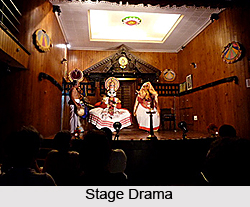S tage for Sanskrit drama is a place where plays are enacted. The various terms used in Sanskrit for stage are natyagriha, natyamandapa, preksagriha or preksagara. The drama and the stage point to each other`s mutual subsistence and a dramatic work becomes most impressive when it is enacted on stage. The ancient Indian kings had pleasure gardens, theatres and music halls connected to their spacious palaces, usually for the amusement of their queens. Histrionics, music and dancing were a part of the education of the high born ladies. The audience consisted of men of education, culture and artistic sense, such as kings, queens, ministers, court poets and courtiers. Music hall was a place where plays were enacted. It was decorated in a unique manner, furnished with flowers, and jewelled pillars. The king used to seat in the middle of the auditorium. Seats for the members of the royal family were provided in the surrounding places. Thus there was a theatre in the palace itself.
tage for Sanskrit drama is a place where plays are enacted. The various terms used in Sanskrit for stage are natyagriha, natyamandapa, preksagriha or preksagara. The drama and the stage point to each other`s mutual subsistence and a dramatic work becomes most impressive when it is enacted on stage. The ancient Indian kings had pleasure gardens, theatres and music halls connected to their spacious palaces, usually for the amusement of their queens. Histrionics, music and dancing were a part of the education of the high born ladies. The audience consisted of men of education, culture and artistic sense, such as kings, queens, ministers, court poets and courtiers. Music hall was a place where plays were enacted. It was decorated in a unique manner, furnished with flowers, and jewelled pillars. The king used to seat in the middle of the auditorium. Seats for the members of the royal family were provided in the surrounding places. Thus there was a theatre in the palace itself.
Stages are said to have been built in continuation of the open courtyard, linking the tank or shed in the temple and the palace. Most of the well known temples of India had natamandiras where dancers and actors propitiated the gods and goddesses through the depiction of their art. In ancient India places, halls or yards were specially provided in temples for dancing, music and recitations. Plats were presented to the general public in open courtyards and on improvised stages. The stage was temporarily built and its equipments wee thus very simple. There was predominance of singing and dancing and of the comic element.
The stage for Sanskrit drama is much different from the concept of stage of the present day. Music halls, temple precincts, and gardens were also used as places for the performance of plays.